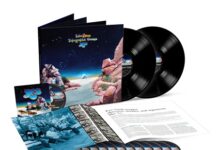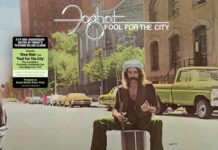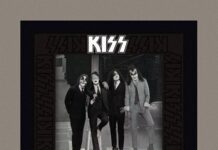Like all good things, the parade of Led Zeppelin 2014-15 remasters covering the band’s studio output, has come to a rousing conclusion with reissues of Presence, In Through The Out Door and Coda. The previous six reissues kicked up the sound, boasted a few commendable odds and ends, charted in the Top 10 and received generally good reviews. And, of course, they got everyone talking about the Led Zeppelin reunion that probably isn’t going to happen. A few spins through these sets, and it could increase the demand. Or not.
In mixed company of fair-weather fans and passionate provocateurs, Presence, In Through The Out Door, and Coda don’t register as highly as Zeppelin’s earlier albums. Both Presence and In Through The Out Door found the band at a strange crossroads — musically and personally. Coda, a hodge-podge collection of previously unreleased music, came after John Bonham passed away and the band had broken up.
The success of Physical Graffiti saddled Led Zeppelin with the burden of releasing a spectacular follow-up. In March 1976, Presence with “The Object” adorning the cover and gatefold — and absolutely no pictures of the band, adding to their mystique — was released to popular acclaim and mixed reviews. The reissue features loads of band photos on the inside cover and companion booklet.
When Presence was recorded, Robert Plant was in convalescence from a serious August 1975 auto accident. The singer broke his ankle and elbow, and was confined to a wheelchair. In recent years, he’s stated his vocals on the record were not what they could ort should have been because of his condition. Nevertheless, the band wrote and rehearsed in LA, and then headed straight to Germany where they recorded the album at Musicland Studios in Munich in 18 days. While the complexities of Physical Graffiti separated Zeppelin from the herd, Presence showed they could still be real, spontaneous, quick and ragged.
“Achilles Last Stand,” the album’s opening track,” showcases Jimmy Page’s brute execution of a lethal riff that manages to tear through the airwaves for over 10 minutes. Once you recover from the sudden blasts of Bonham, he pulls back with a slow blues called “For Your Life,” a song the band never played live until it popped up on the setlist during the 2007 reunion concert in London. Both “Royal Orleans” and “Hot On To Nowhere” are hip-shaking shuffles with very in-the-moment vibes, while “Nobody’s Fault But Mine” is Blind Willie Johnson’s “It’s Nobody’s Fault But Mine” on steroids. “Candy Store Rock” and “Tea For One” dutifully fill out the rest of the original album in fine and eloquent style.
The second disc includes “reference mixes” of “Achilles Last Stand,” “For Your Life,” “Royal Orleans” and “Hots On for Nowhere,” essentially livelier renditions with an extra guitar here and there, up against the occasional quirky vocal mix. The real gem is “10 Ribs & All/Carrot Pod Pod (Pod),” built around a simple piano line undoubtedly conjured up by John Paul Jones. While it’s not likely to break out on big on the FM dial, its fascination lies in a total aberrancy of everything Led Zeppelin is to the general public. The thud of Bonham’s drumming is about the only thing that gives it that Zeppelin stamp.
While the group toured the States in 1977, tragedy struck again for Robert Plant when his five-year-old son Karac died of a stomach infection. The singer was so grief-stricken, he considered leaving the band. But then they regrouped in 1978 to begin work on their final album, In Through the Out Door. When it was released in August 1979, there were six different covers (the same bar photo from six different angles) for fanatics to chase down. Whether that or the music took it Number One remains a mystery, for certainly Led Zeppelin was a different band with more keyboards and input from Jones, and less relevance in the age of oncoming rage of punk.
Even with its heavy synth-laced underlining, “In The Evening” is a classic Zeppelin epic that lets Page twist and tingle around at the break. The honky-tonk piano boogie of “Southbound Saurez” puts Page in a support role with a rare no-writing credit, but its radio-friendly warmness made it a favorite go-to track for radio programmers looking for something other than “Fool In The Rain” to play from In Through the Out Door. Then again, the same could be said for the playful roots rag of “Hot Dog.”
“Carouselambra” is the album’s other epic, broken into three sections, with both Jones and Page leading the charge and Bonham marching the beat along at a steady and firm pace. It’s a shame they never played it live because it might have ruptured the spirit of every living soul within a hundred yards. The heart-strings of the album belong to “All My Love,” one of Zeppelin’s smoothest strokes and an ode to Plant’s son. There was definitely a soft spot in the bombastic band’s bag of tricks. “I’m Gonna Crawl” maintains the solemn face and allows Plant to deliver one last great vocal as the band, unknowingly at the time, left their final mark. Unfortunately, the rough mixes of each of the album’s original seven songs comprising the second disc do little to warrant further investigation.
Coda came out in 1982, two years after John Bonham’s untimely death. It was meant to seal the deal on Led Zeppelin with everything that was supposedly left – from the early days of concert opener “We’re Gonna Groove” and “I Can’t Quit You Baby” to the Led Zeppelin III era of “Poor Tom” and onto the later years with “Walter’s Walk,” a holdout from Houses Of Holy, and songs recorded during and after In Through The Outdoor – “Ozone Baby,” “Darlene,” “Bonzo’s Montreux” and “Wearing And Tearing,” a song Page and Plant performed during a rare appearance together at Knebworth in 1990.
You can get the one-disc version, but Coda in full bloom is the three-disc Deluxe Edition, loaded to the gills with unreleased stuff. There’s a rough and lazy version of “When The Levee Breaks” called “If It Keeps On Raining” that Page found. “Baby Come Home,” which has appeared on previous Zeppelin compilations and reissues, is a blue-gospel number, complete with choir, Page’s guitar run through a Leslie guitar and John Paul Jones on Hammond organ. It’s a song based Bert Berns’ “Baby Come On Home” with different lyrics, another one unlike anything Zeppelin ever released when they were together.
When Zeppelin recorded “Sugar Mama,” it was probably discarded for its simplicity, and lack of development. Listening to it now, it sounds like the framework of what could have been a better song with a few more lyrics. The oft-heard “Traveling Riverside Blues” and “Hey Hey What Can I Do” likely made the cut because neither ever appeared on any Zeppelin studio album. By the time you get to the third disc, your appetite may be whetted enough, but that’s where the real treasure is.
In 1972, Page and Plant ventured to Mumbai and recorded with a group of Indian musicians known as the Bombay Orchestra. From those sessions, “Four Hands” (aka “Four Sticks”) and “Friends” have been included here, reminding everyone just how exotic and experimental Zeppelin could be. By contrast, “St. Tristan’s Sword” recorded during the Led Zeppelin III sessions in 1970, reveals the band’s gift for impromptu jamming. Rough mixes of “Desire” (aka “The Wanton Song”), “Bring It On Home,” “Walter’s Walk” and “Everybody Makes It Through” (aka “In The Light”) are fine examples of the group constantly refining its sound while Page, as producer, tweaked out the arrangements to become what fans would refer and cherish.
The real question now is whether Presence, In Through The Out Door and Coda are last word on Led Zeppelin? Surely, there’s more live material, both audio and video, fans would eat up. Could a reissue of The Song Remains The Same be next? Or maybe a Blu-ray of the 2003 Led Zeppelin DVD set would help prompt Page to dig deeper for footage fans are craving to see. Unlike Bob Dylan, the Beatles, the Rolling Stones, and the Who, Led Zeppelin apparently didn’t stockpile a whole lotta songs, so this could be it on the rarities and unreleased stuff. And unless they go to surround, it’s doubtful you could make the studio albums sound much better than what Jimmy Page has done with them over the last couple years. We’ll have to see if there’s anything left. That mystique is still very much alive in the world of Led Zeppelin.
~ Shawn Perry




















